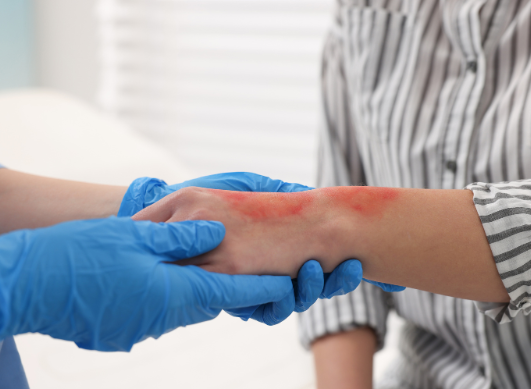- Home
- Forums
- General forums
- Good to know
- 7 sunscreen myths vs facts
7 sunscreen myths vs facts
- 128 views
- 0 support
- 4 comments
All comments
![]()
Johannawarren2002
Good advisor
![]()
Johannawarren2002
Last activity on 07/03/2024 at 19:53
Joined in 2017
9 comments posted | 4 in the Good to know group
Rewards
-
Good Advisor
-
Contributor
-
Committed
-
Explorer
-
Evaluator
Please don't use the term "chemical free" - all ingredients in sunscreens (and every other product) are chemicals, even zinc oxide and titanium dioxide. The different UV filters can be described as either organic or physical. Chemical-free is part of a scaremonger tactic used by groups such as EWG. It is simply, wrong!

Margarita_k
Good advisor
![]()
Margarita_k
Last activity on 07/10/2020 at 11:39
Joined in 2016
1,195 comments posted | 118 in the Good to know group
2 of their responses were helpful to members
Rewards
-
Good Advisor
-
Contributor
-
Messenger
-
Committed
-
Explorer
-
Evaluator
Hi @Johannawarren2002,
Thank you for your comment and your remark, which is absolutely correct.
Kind regards,
Margarita
See the signature
Community Manager

Jul14e
Jul14e
Last activity on 14/11/2025 at 05:26
Joined in 2017
2 comments posted | 2 in the Good to know group
Rewards
-
Explorer
Hi Margarita,
You should also wear sun screen even if it's not sunny. You can burn on days where the sun is obscured and a breeze can mask the intensity of the sun. Sun protection should be used in the U.K. too, even though the sun isn't as hot and we get less sunny days, skin cancer is still a massive risk. I know; my dad died from a secondary cancer caused by a malignant melanoma from being burnt on a beach in Devon. Always wear the best sunscreen you can afford is my advice and slap it on liberally.
Best wishes
Julie xxx
See the signature
Julie x

Margarita_k
Good advisor
![]()
Margarita_k
Last activity on 07/10/2020 at 11:39
Joined in 2016
1,195 comments posted | 118 in the Good to know group
2 of their responses were helpful to members
Rewards
-
Good Advisor
-
Contributor
-
Messenger
-
Committed
-
Explorer
-
Evaluator
Hi @Jul14e, first of all, please accept my condolences for the loss of your dad!
As for your advice, you are absolutely right: sunscreen is to be applied every time we walk out into the sun, no matter if it is in Spain or in the UK.
Take care!
Regards,
Margarita
See the signature
Community Manager
Articles to discover...
Subscribe
You wish to be notified of new comments
Your subscription has been taken into account








Margarita_k
Good advisor
Margarita_k
Last activity on 07/10/2020 at 11:39
Joined in 2016
1,195 comments posted | 118 in the Good to know group
2 of their responses were helpful to members
Rewards
Good Advisor
Contributor
Messenger
Committed
Explorer
Evaluator
According to the Environmental Working Group (EWG), manufacturers continue to mislead consumers about how well sunscreens protect against the sun's powerful rays. But don't let a little bad news about sunscreen scare you off. It's important to moderate your sun exposure and to wear SPF because there's proof that sunburns and spending excessive amount of time in the sun can lead to skin cancer. A study published in 2014 in the journal Cancer Epidemiology, Biomarkers & Prevention found that women who had at least five sunburns between ages 15 and 20 had an 80 percent increased risk of melanoma.
Given the scary stats on skin cancer, it’s essential that you know how to apply SPF properly to ensure you’re as protected as possible from UV damage. To arm you with this skill and bring you up-to-date on all your sun protection knowledge in general, we asked some top dermatologists to separate fact from fiction regarding what sunscreens are best, worst, harmful (or not), and more. See which common misconceptions they've debunked — and which tips are legit — so that you can make smart sun decisions all year long.
Myth 1: The Higher the SPF, the Better
Reality: “There is very little difference in an SPF 30 or 50 or 100 in terms of the total percentage of ultraviolet light blocked,” says Elizabeth Tanzi, MD, a dermatologist. “So it's far better to use an SPF 30 appropriately than an SPF 50 without reapplying.” To get enough coverage, follow these rules: Apply two ounces (about a shot glass worth) of sunscreen 30 minutes before you go outside, and reapply every two hours.
Myth 2: Makeup With SPF Offers Adequate Sun Protection
Reality: “Using makeup with SPF doesn’t offer enough protection because makeup is usually applied unevenly onto the skin,” says David Bank, MD, director of The Center for Dermatology, New York. What’s more, the SPF in your makeup only lasts two hours, says Macrene Alexiades, MD, a New York City-based dermatologist. You can still use your favorite foundation or powder with SPF — just layer it on over your sunscreen. “Doing this will double your chances of protecting your skin,” says Dr. Bank.
Myth 3: The Ingredients in Sunscreen Cause Cancer
Reality: While this is a common misconception, there’s no strong scientific study linking the ingredients in sunscreen to cancer, says Dr. Tanzi. “However,” she says, “there are many studies linking excessive sun exposure to skin cancer, so the answer to this argument is simple: wear sunscreen. It's a no-brainer.” Not all sunscreens have chemical ingredients, so if you're worried, choose a chemical-free formula with zinc oxide or titanium dioxide instead, says Bank.
Myth 4: You Don't Need to Use Sunscreen Everywhere
Reality: If you overlook any areas, you may increase your risk for skin cancer. “I often find the most worrisome moles on the palms and soles,” says Dr. Alexiades. “For starters, these areas have far less pigment — they don’t tan — and second, people rarely put sunscreen on their palms and soles, so they get unprotected intense exposure.” Alexiades recommends saving the more expensive sunscreen for your face and using a cheaper version on your body to make sure you’re actually applying enough. “People tend to under-apply if they use a high-priced sunscreen,” she says.
Myth 5: Kids' Sunscreen Is Gentler
Reality: Sunscreens for both kids and adults contain the same active ingredients; they just have different formulations, explains Tanzi. “Adult sunscreens tend to be more cosmetically elegant — they go on sheer and invisible — whereas kids' sunscreens can be a little thicker and more opaque since kids usually don’t care,” she says. Many kids' sunscreens are formulated to be tear-free so they won’t sting your eyes. If you find sunscreen irritating, opt for a physical sunscreen, which contains natural active ingredients like zinc or titanium dioxide, advises Tanzi. “Physical sunscreens are always the better option for sensitive skin because there are no chemicals that can react,” she says.
Myth 6: Lotion Sunscreens Work Better Than Spray Sunscreens
Reality: “There is no real difference — it depends on what you prefer in terms of how it feels on your skin,” says Bank. If you find lotions to be sticky, you might be inclined to apply less than you should because you don't like the texture, says Alexiades. In that case, opt for a spray. “The speed of application of spray-on sunscreens translates to faster, more efficient coverage, which is very helpful if you are already at the beach and need to apply,” she says. According to a recent investigation by Consumer Reports, many people are using both lotion and spray sunscreens ineffectively or inconsistently. For that reason, Tanzi says, "Just make sure you’re using enough — the entire sprayed area should be wet with product." If you're concerned about inhaling it, first spray it into the palm of your hand, then spread it over your body.
Myth 7: You Don't Have to Reapply Water Resistant Sunscreen
Reality: The FDA's newest guidelines state that any water resistance claims must include how much time you can expect to be protected while swimming or sweating: either 40 or 80 minutes, says Bank. Under the new guidelines, which went into effect in June 2012, sunscreen manufacturers can no longer claim their products are waterproof or sweatproof.
Source: everydayhealth.com